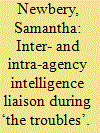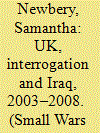| Srl | Item |
| 1 |
ID:
181043


|
|
|
|
|
| Summary/Abstract |
Intelligence is crucial to success in counter-terrorism, and successful intelligence work involves effective liaison between and within all the organisations involved. Scholars rarely address intelligence in counter-terrorism other than through case studies, while studies of intelligence in counter-insurgency and studies of international intelligence liaison emphasise the value of intelligence liaison with little attention to how it works in practice. This article substantially expands existing knowledge and understanding by focusing on intelligence coordination within Northern Ireland in the 1990s. It draws on heretofore unexploited, yet voluminous, original material. It analyses the contribution that computerisation made to inter-agency liaison, the contribution the Northern Ireland Prison Service made to intelligence work, the role played by intra- and inter-agency structures and the valuable work that the right individuals in the right posts can do. This article thereby provides a broader and deeper understanding of the challenges faced by state agencies and how some of these were overcome to facilitate inter- and intra-agency intelligence liaison in Northern Ireland in the 1990s. It therefore contributes to emerging theory that seeks to explain intelligence.
|
|
|
|
|
|
|
|
|
|
|
|
|
|
|
|
| 2 |
ID:
091746


|
|
|
|
|
| Publication |
2009.
|
| Summary/Abstract |
When internment was introduced in Northern Ireland on 9 August 1971, the Stormont and British Governments received immediate criticism for the move from within the United Kingdom and the Republic of Ireland. Condemnation widened as reports of ill-treatment at the hands of the security forces during arrest, whilst in custody and employed in conjunction with interrogation reached the public domain. After arrest prisoners were first questioned by the police to confirm the right person had been arrested and to establish whether they should be questioned with a view to preferring a criminal charge, whether they should be transferred to an interrogation centre for secondary interrogation with the aim of eliciting intelligence, or, if unsuitable for either of these, be released. In addition to secondary interrogation, 14 men were interrogated 'in-depth'.
|
|
|
|
|
|
|
|
|
|
|
|
|
|
|
|
| 3 |
ID:
146229


|
|
|
|
|
| Summary/Abstract |
The UK’s interrogation operations during the conflict in Iraq (2003–2008) are often portrayed by the media as involving significant amounts of mistreatment. This article demonstrates that these practices are not necessarily representative of the UK’s interrogation operations across this conflict. In doing so it contributes to the limited literature on the practice of interrogation and on the UK’s combat operations in Iraq. The UK’s interrogation capability, and therefore its intelligence-gathering capability, is shown to have rested primarily with the military’s Joint Forward Interrogation Team (JFIT). The JFIT suffered from limitations to the number, training and experience of its interrogators and interpreters. It is argued that maintaining a permanent, higher level of preparedness for interrogation by the British armed forces is desirable.
|
|
|
|
|
|
|
|
|
|
|
|
|
|
|
|